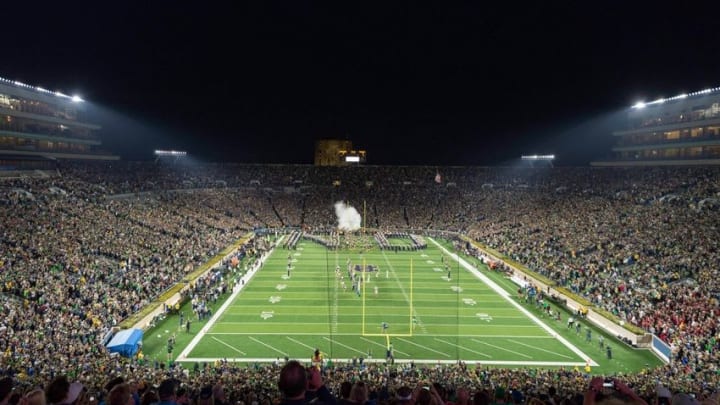It’s true: Notre Dame is a 2-5 football team. As a fan, it is completely normal to be frustrated. There is some room, however, for optimism in the program.
There is no doubt that it is a rough time to be a Notre Dame fan, but much of criticism from Notre Dame fans has been a bit extreme. Certainly there are plenty of places to cast the blame. The team has not lived up to expectations. The coaches certainly have not, either.
There are plenty of things to be upset with Brian Kelly about—what he says in post-game press conferences is not necessarily one of them.
Many people perceive that Kelly is casting blame on everyone but himself in his post-game press conferences. However, Kelly has repeatedly emphasized that he has to coach better. That, however, is only a part of the equation.
In the bigger picture, it is important to note the nature of these press conferences. Moments after a loss, Kelly often takes the podium to discuss what went wrong in the game his team just lost. Emotions are extreme. No one has had time to truly process what has happened.
And then come the questions.

Given the nature of a loss, everyone wants to know about a pivotal play or series of plays. Keep in mind, though, the questions Kelly fields are about what went wrong. In that instance, it is tough to criticize Kelly for simply pointing out mistakes. Is that casting blame or is it simply describing what happened on a particular play?
It is also fair to point out that multiple players have come to Kelly’s defense in regard to the “blaming” of players. Both DeShone Kizer and Mike McGlinchey have gone on record in recent days to say the feeling among the team is that Kelly is not blaming the players, but rather holding them accountable for their mistakes.
What went wrong?
There are a plethora of reasons the Irish are struggling this season. Youth is one of them. The Irish are playing 10 to 12 freshmen regularly on defense. On offense, their most talented receiver caught just one pass last season. Two offensive linemen went to the NFL. Their second-leading tackler from last season was dismissed from the team prior to the start of the season.
What, then, separates the youth of the Irish from the youth at other programs? One major difference is a knowledge and execution of the fundamentals. Tackling, penalties and execution have all been issues for the Irish. To combat this, the coaching staff is addressing fundamental issues with a baptism-by-fire mentality. It’s not always fun to watch, but the current players will continue to develop. Struggles do not indicate a lack of talent.
Finally, it is worth noting that Notre Dame does not have the same luxuries other schools have. Notre Dame student-athletes are encouraged and expected to graduate in four years (sometimes even less than that), regardless of athletic eligibility. In other words, it is somewhat rare for a Notre Dame player to stick around for a fifth year after achieving his degree.
State schools do not follow the same blueprint as the Irish. At other schools, players are encouraged to spread out their classes and obtain their undergraduate degree in five years. Such schools benefit from an extra year to develop their players and utilizing added leadership.
Is there any reason for optimism?
Many Irish players are gaining game experience they otherwise would not have gotten had they been forced to sit on the bench. In the long-term, the future continues to be bright. Along the way, however, there will continue to be significant growing pains.
There are a few positives to this situation. Many very talented Irish players will be back next season. Whether or not DeShone Kizer will choose to stay is a mystery, but outside of Kizer, Notre Dame will return nearly their entire starting offense, including the entire offensive line, their best receiver and their best running back. The Irish also have a top-10 recruiting class in 2017.
There is no telling if this process translates into wins the rest of the season. Regardless, Notre Dame football will live on and should be pretty fun to watch in seasons to come.
